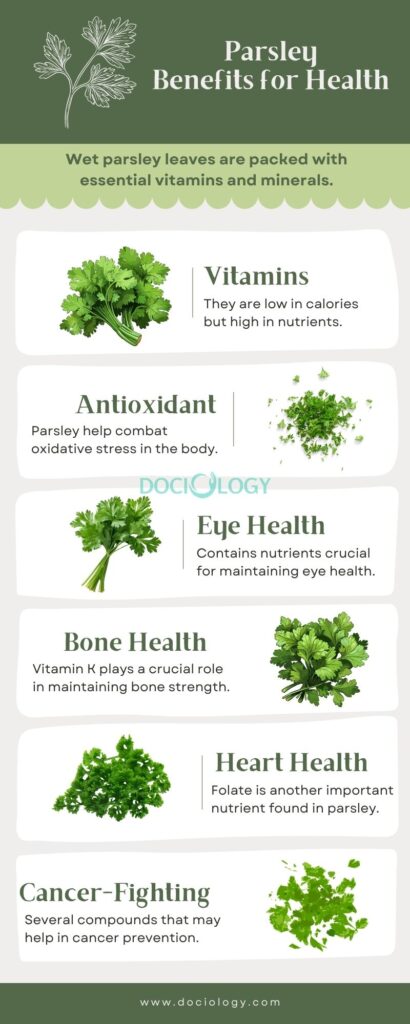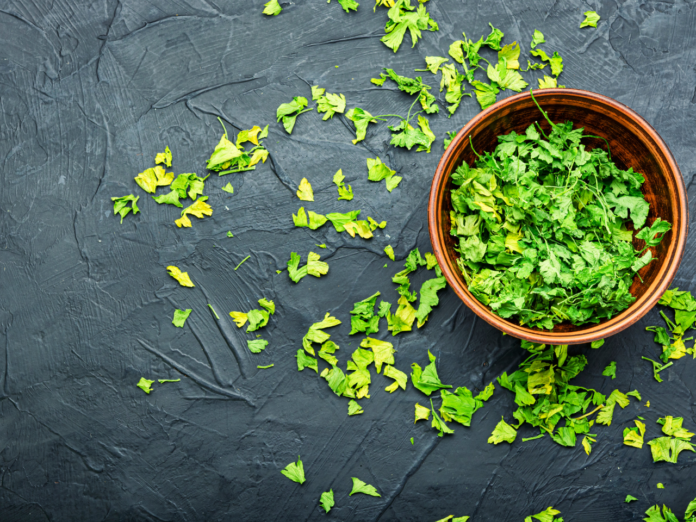Did you know that parsley is packed with nutrients? This humble herb offers a wealth of health benefits from parsley. It’s not just a garnish; it’s a powerhouse of vitamins A, C, and K, beta carotene. These nutrients support your immune system, promote healthy skin, and strengthen bones.
Incorporating parsley, a healthy herb and antioxidant, into your meals can boost your overall well-being. It helps with digestion and fights inflammation too. Whether you sprinkle it on salads or blend it in smoothies, adding parsley to your diet is an easy win. Discover how this simple herb can enhance your health and elevate your dishes.
Key Takeaways
- Parsley is rich in vitamins A, C, and K, making it a nutritious meal addition.
- Regularly consuming parsley can help boost your immune system and improve overall health.
- Add fresh parsley to salads, soups, or smoothies for an easy way to enhance flavor and nutrition.
- Studies show that parsley may have anti-inflammatory properties, which can support heart health.
- Experiment with parsley in various dishes to discover new flavors and reap its health benefits.
- Make parsley a staple in your kitchen to enjoy its numerous health advantages every day.
Nutritional Content of Parsley
Essential Vitamins and Minerals
Wet parsley leaves are packed with essential vitamins and minerals. They are low in calories but high in nutrients. A small serving provides a significant amount of Vitamin K, which supports bone health. It also contains Vitamin C, important for immune function.
Minerals like iron and potassium are present as well. Iron aids in red blood cell production. Potassium helps regulate blood pressure. Thus, parsley contributes to overall health without adding many calories to your diet.
Antioxidant Richness
Parsley is rich in antioxidants that offer many health benefits. Key antioxidants include flavonoids and vitamin C. These compounds help combat oxidative stress in the body, which can lead to chronic diseases.
The difference between dehydrated parsley and fresh parsley lies in their antioxidant levels. Fresh parsley generally contains higher levels of these beneficial compounds. Eating fresh parsley can provide better protection against free radicals compared to dried forms.
Eye Health Support
Parsley contains nutrients crucial for maintaining eye health. One important nutrient is Vitamin A, which plays a key role in vision. It helps prevent age-related vision issues such as macular degeneration.
Other carotenoids found in parsley also support eye function. They protect the eyes from harmful light exposure. Regular consumption of parsley can contribute to better overall eye health.

Health Benefits of Parsley
Bone Health Support
Vitamin K plays a crucial role in maintaining bone strength. Parsley is rich in this vitamin, which helps bones stay strong and healthy. Regularly eating parsley may lower the risk of fractures. This herb supports bone-building cells called osteoblasts. By enhancing their function, parsley contributes to overall bone health.
So, next time you’re making a delicious dish, consider adding some parsley for that extra boost to keep your bones strong and help prevent fractures.
Heart Health Improvement
Folate is another important nutrient found in parsley. It supports cardiovascular health by helping to lower homocysteine levels in the blood. High dietary folate intake can reduce the risk of heart disease. Studies have shown that people with higher folate consumption tend to have better heart health. Adding parsley to meals can be an easy way to boost heart health.
In simpler terms, eating parsley can help keep your heart healthy by lowering a substance called homocysteine in your blood. This can reduce the chance of getting heart disease. So, adding parsley to your meals is a tasty way to take care of your heart!
Cancer-Fighting Properties
Parsley contains several compounds that may help in cancer prevention. Among these, Vitamin C stands out for its potential role in reducing cancer risk. This vitamin acts as an antioxidant, protecting cells from damage. A diet rich in cancer-fighting foods like parsley can contribute to overall wellness. Including parsley regularly may enhance your body’s ability to fight off cancer.
Did you know that parsley is not just a garnish, but it can also help your body stay healthy and fight off diseases like cancer? By eating foods rich in cancer-fighting properties, such as parsley, you can give your body the extra boost it needs to stay strong and well.
Antibacterial Effects
Parsley extract has notable antibacterial properties against harmful bacteria. Research indicates it can effectively prevent foodborne illnesses. These antibacterial effects make parsley a valuable addition to food preparation. Studies support its capabilities in fighting bacteria like E. coli and Salmonella. Using parsley can help maintain food safety and enhance health.
If you want to keep your food safe from harmful bacteria like E. coli and Salmonella, using parsley in your cooking can be a smart choice.
Incorporating Parsley into Diet
Simple Preparation Methods
Adding parsley to meals is simple. Fresh parsley can be chopped and sprinkled on almost any dish. It works well in salads, soups, and stews. Dried parsley also offers convenience. It can be mixed into sauces or used in marinades. Both fresh and dried options are versatile. They adapt easily to different cooking methods.
Using a parsley supplement or parsley extract can provide health benefits too. These forms allow you to enjoy the herb without cooking. You can also try parsley tea for a refreshing drink. This method is quick and easy.
Daily Meal Ideas
Many meals can feature parsley. For breakfast, consider adding chopped parsley to scrambled eggs. This adds flavor and nutrition. At lunch, toss some raw parsley into a salad for freshness.
For dinner, sprinkle flat-leaf parsley over roasted vegetables or pasta dishes. Curly-leaf parsley can serve as a garnish on plates. This enhances both taste and presentation.
Explore various ways to use parsley in your cooking. Be creative with spices and herbs to complement its flavor.
Enhancing Dishes with Flavor
Parsley elevates the flavor profile of many dishes. It adds a bright taste that balances rich ingredients. Use parsley in dressings to create delicious vinaigrettes. Mixing it with olive oil and vinegar makes a flavorful dressing.
In sauces, parsley provides freshness and depth. It pairs well with garlic and lemon for a zesty kick. Marinades benefit from added parsley too, making meats more flavorful.
As a garnish, parsley serves two purposes: it enhances taste and adds visual appeal. A sprinkle of fresh parsley can transform a simple dish into something special.

Scientific Evidence of Benefits
Research on Cancer Prevention
Recent studies highlight parsley’s role in cancer prevention. Researchers found that parsley contains compounds like apigenin and luteolin. These compounds show promise in inhibiting tumor growth. A 2021 study published in the Journal of Nutritional Biochemistry indicated that apigenin can reduce cancer cell proliferation.
Incorporating parsley into a cancer-preventive diet may be beneficial. People who eat more fruits and vegetables, including parsley, often have lower cancer rates. This suggests that adding parsley to meals can enhance overall health.
Studies on Antibacterial Properties
Research shows that parsley has strong antibacterial effects. A study from 2020 examined the extract of parsley and its impact on various bacteria. The findings revealed that parsley effectively inhibited the growth of harmful bacteria like E. coli and Salmonella.
These results have significant implications for food safety. Using parsley in cooking could help reduce the risk of foodborne illnesses. Its potential as a natural preservative makes it an excellent choice for enhancing flavor while promoting safety in meals.
Evidence for Heart Health
Studies link parsley consumption with improved heart health. Research published in the American Journal of Clinical Nutrition found that people who regularly consume parsley have better cardiovascular health markers. This includes lower blood pressure and cholesterol levels.
Parsley is rich in vitamins and antioxidants that contribute to heart wellness. It helps reduce inflammation and improves circulation. Including heart-healthy foods like parsley in daily meals supports overall cardiovascular wellness.
Final Remarks
Parsley packs a punch with its rich nutritional profile and numerous health benefits. From boosting your immune system to improving digestion, incorporating this herb into your meals can enhance your overall well-being. It’s easy to add parsley to your diet, whether in salads, smoothies, or as a garnish.
Don’t underestimate the power of this green powerhouse. Dive into the world of parsley and experience its benefits firsthand. Start adding it to your dishes today for a healthier tomorrow. Your body will thank you!
Frequently Asked Questions
What are the nutritional benefits of parsley?
Parsley is rich in vitamins A, C, and K. It also contains minerals like iron and potassium, along with antioxidants that help combat oxidative stress.
How does parsley benefit digestion?
Parsley aids digestion by stimulating the production of digestive enzymes. Its high fiber content also promotes regular bowel movements.
Can parsley help with inflammation?
Yes, parsley has anti-inflammatory properties due to compounds like flavonoids and vitamin C, which may help reduce inflammation in the body.
Is parsley good for heart health?
Absolutely! Parsley supports heart health by lowering cholesterol levels and improving circulation, thanks to its high antioxidant content.
How can I incorporate parsley into my diet?
You can add fresh parsley to salads, soups, or smoothies. It also works well as a garnish for various dishes, enhancing flavor and nutrition.
Are there any risks associated with consuming parsley?
While generally safe, excessive consumption may lead to allergic reactions or digestive issues in some individuals. Moderation is key.
Does parsley have any cancer-fighting properties?
Preliminary studies suggest that the antioxidants in parsley may help protect against certain cancers by neutralizing free radicals and inhibiting tumor growth.




